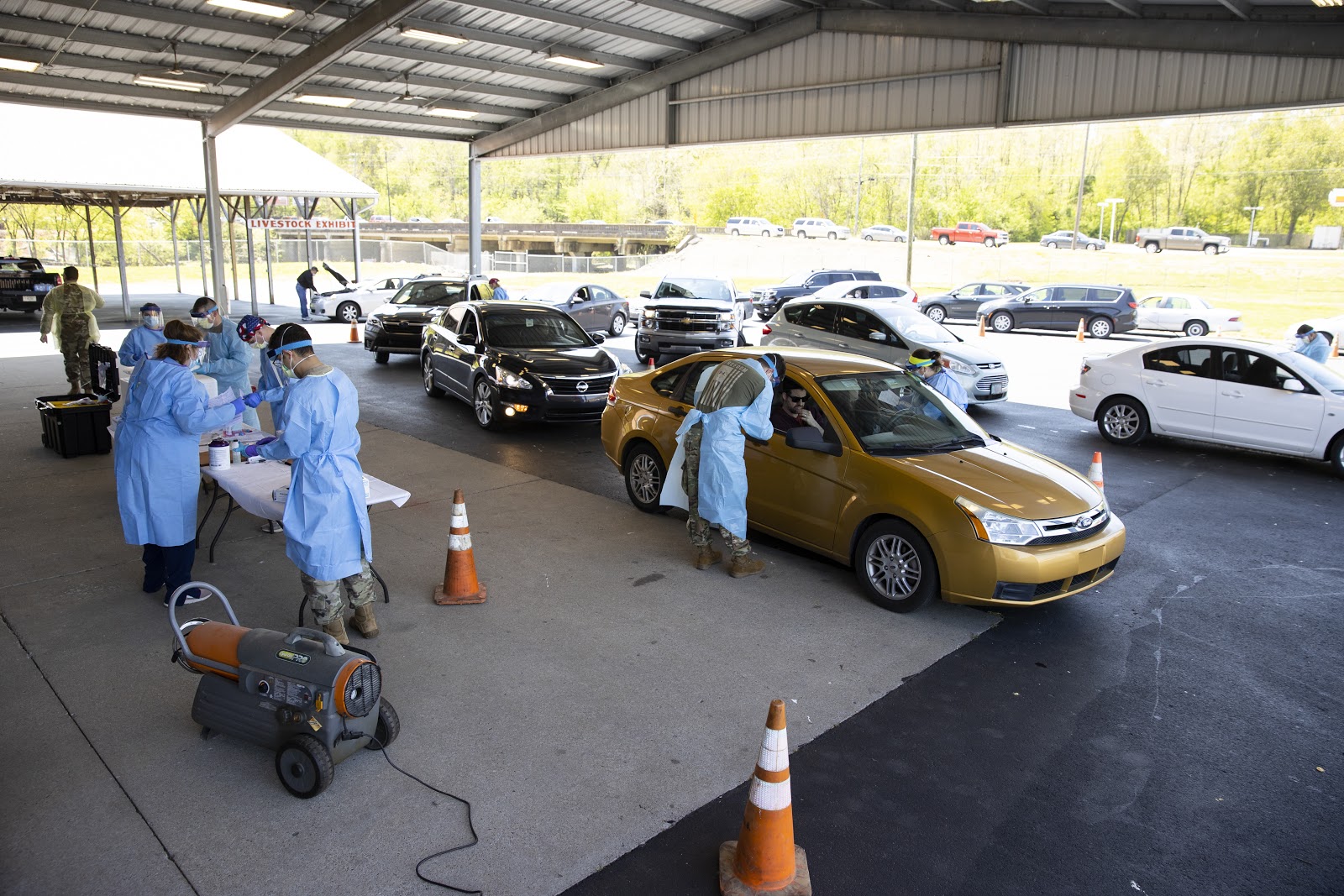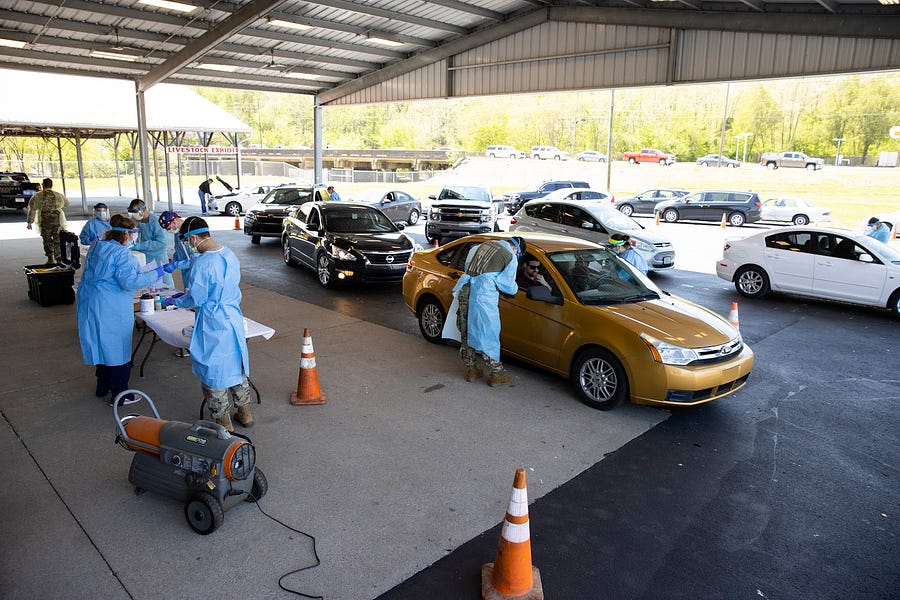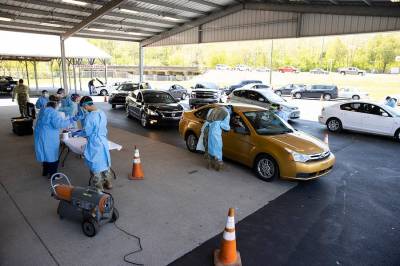Happy Tuesday. Some nights, the biggest late-breaking story you have to deal with is the airing of a Michael Jordan documentary. Other nights, the president announces he is temporarily suspending all immigration to the United States via executive order and news reports lead to wild speculation over whether the Supreme Leader of North Korea is dead or alive. Last night was the latter.
Quick Hits: Today’s Top Stories
As of Monday night, there are now 787,370 confirmed cases of COVID-19 in the United States (a 3.7 percent increase from yesterday) and 42,335 deaths (a 4.1 percent increase from yesterday), according to the Johns Hopkins University COVID-19 Dashboard, leading to a mortality rate among confirmed cases of 5.4 percent (the true mortality rate is difficult to calculate due to incomplete testing regimens). Of 4,003,551 coronavirus tests conducted in the United States, 19.7 percent have come back positive. There are 117,363 Americans hospitalized with COVID-19 complications (a 1.4 percent increase from yesterday), and 72,761 have recovered from the virus (a 2.6 percent increase from yesterday).
In a tweet at 10:06 p.m. last night, President Trump announced he’d be signing an executive order to “temporarily suspend immigration into the United States.” Immigration had essentially already been at a standstill due to various coronavirus restrictions; as we hit send on this newsletter, the administration has not provided any additional context or information on the executive order.
CNN is reporting that American officials are “monitoring intelligence that North Korea's leader, Kim Jong Un, is in grave danger after a surgery.” South Korean officials disputed the reports, telling Reuters they have not picked up any such information about their neighbor to the north.
The Department of Homeland Security announced the United States, Mexico, and Canada have agreed to extend restrictions on non-essential travel between the countries for an additional 30 days.
U.S. oil prices plunged below zero for the first time in history on Monday, with West Texas Intermediate settling in at -$37.63 a barrel. Coronavirus lockdowns have decimated demand for crude; with continued production and limited storage capacity, producers are now having to pay “buyers” in order to offload excess supply.
After nearly a year-and-a-half stalemate, Israeli leaders have reached an agreement to form a coalition government. Prime Minister Benjamin Netanyahu will remain in his role for 18 months, at which point the more liberal Blue and White leader Benny Gantz will swap positions with Netanyahu—relegating the head of the more conservative Likud to vice prime minister.
Governors in four states—Georgia, South Carolina, Tennessee, and Texas—have announced plans to begin loosening coronavirus-related restrictions as early as Friday.
The Supreme Court held that the Sixth Amendment’s right to a jury trial requires states to mandate unanimous jury verdicts for serious offenses. This ruling overturned a previous precedent from 1972 that had allowed Oregon and Louisiana to convict defendants with less-than-unanimous juries.
Should States Be Getting Their Own Tests? The White House Isn’t Sure

Throughout his presidency, Donald Trump has frequently shown he is most comfortable when the challenges facing him include an identifiable personal adversary. During the coronavirus crisis, there have been many such foes: from the virus itself (anthropomorphized as the smart, cunning “invisible enemy”) to China to the media to Democratic governors like Andrew Cuomo and Gretchen Whitmer. Yesterday, Trump added a new name to the roster: Gov. Larry Hogan, Republican of Maryland, who announced this week he had secured a major testing victory for his state by obtaining the makings of 500,000 coronavirus test kits from South Korea.
At his daily press conference, Trump plainly wasn’t impressed. “The governor of Maryland could have called Mike Pence. Could have saved a lot of money. … No, I don’t think he needed to go to South Korea. I think he needed to get a little knowledge—would have been helpful.” Trump’s testing czar, Adm. Brett Giroir, was similarly smirky: “I don’t know what the governor of Maryland is doing in South Korea.”
It was a perplexing moment—because, as Steve Hayes details in a piece on the site today, Trump has been insisting for weeks that governors aren’t doing enough to build out their own testing operations:
“Don’t forget, we’re a secondary source,” Trump said on April 2, discussing efforts to obtain personal protective equipment. “The states are doing it and we’re backing them up.” He added: “The states should have been building their stockpile…We’re a backup. We’re not an ordering clerk. We’re a backup.”
He continued the next day. “We have a federal stockpile and they have state stockpiles. And, frankly, they were—many of the states were totally unprepared for this. So, we had to go into the federal stockpile. But we’re not an ordering clerk. They have to have for themselves.”
And just Sunday, Trump shrugged off federal responsibility for testing: "Testing is a local thing. It's very important. It's great, but it's a local thing."
It gets stranger. It isn’t just that Trump scolded Hogan for going out and securing tests for his state. At his Tuesday presser, Hogan even seemed to suggest that he had been worried the federal government would intercept and confiscate the test kits. Here’s Steve again:
Even after he’d reached agreement with his Korean counterparts, Hogan wasn’t certain that he’d be able to get the tests. His concern wasn’t a mixup with his foreign partners, logistical confusion with the travel or budgetary problems back home. Instead, Hogan was worried that the federal government would intercept the delivery. “It was a concern for us,” he said in response to the final question at his news conference, about the possibility the federal government would interfere with the delivery of the tests. “And we were just happy to have successfully landed that plane at BWI. Don’t want to get into all the details of how that came about but that was a big part of our concern.”
Mass Testing Still Isn’t Ready, And We’re Running Out Of Time
The tensions between Trump and Hogan underscore a fact that is shaping up to be one of the biggest dangers of the next phase of the pandemic: We still lack both the raw testing capacity and the interstate coordination infrastructure required to have any confidence in our ability to track the coronavirus nationally. And time for us to get there is running short.
It’s been nearly three weeks since the U.S. first managed to run more than 130,000 tests in a single day on April 3. Over the previous month, testing had ramped up ferociously: from less than 10,000 a day in the first half of March to more than 106,000 on March 31, according to the COVID Tracking Project. We’d gotten a late start, but the trajectory seemed promising.
Since then, however, that growth has flattened. For the past two weeks, daily tests have vacillated between about 130,000 and 160,000 tests a day, with no sign that more aggressive growth is in our future.
Worse, without a coordinated strategy to track the course of the virus, there’s little indication the tests we are running are even going to the people most in need of testing—those who are most likely to spread the disease themselves. CDC guidelines still call for asymptomatic individuals who are not in at-risk groups not to be tested at all.
These problems have been apparent for weeks, but there seemed to be cause for hope that advances in testing technology that would solve them were right around the corner. But those technologies, while still promising, don’t seem much closer now than they were then. The point-of-care Abbott Industries COVID tests, which President Trump showed off in the Rose Garden in March and which have the benefit of not needing to be processed in an off-site lab, are idling on hospital shelves. Other antibody tests, which promise to help us get a sense of how widely the virus has already spread if not where it is at any immediate moment, are proving to be in general streakier, less accurate, and less widespread so far than it was initially hoped.
The experts are close to unanimous here: We want to start reopening parts of the economy soon, but it would be a dire mistake to start reopening before testing is up to snuff. The White House’s own road map, which we discussed last week, is predicated on these criteria. But the testing planners are out of time: The reopenings are starting to arrive, whether they like it or not. Georgia Gov. Brian Kemp announced that the state will begin to allow the reopening of many businesses between now and next Monday. If many others follow suit before our federal government can figure out how to get adequate surveillance testing on the ground around the country, the results are likely to get very messy.
Anti-Quarantine Protests Represent a Very Loud Minority

If you’ve turned on a TV in recent days, your eyes have almost assuredly been met by throngs of demonstrators congregating in front of statehouses across the country. From Pennsylvania, to Texas; Michigan, to Maryland, small groups are organizing protests against governors whose shelter-in-place orders they believe to be both overstepping constitutional bounds and inhibiting their way of life.
“I’d like to see the Constitution be restored and let us all go back to work, and enjoy our restaurants,” a protester in Colorado told ABC Denver. “If you’re not comfortable with that, then you can make the choice to stay home. There’s nothing wrong with that.”
“All the projections were wrong, but we are still telling people to stay home and businesses to close,” a retired truck driver told Reuters. “This is not quarantine, this is tyranny.”
A truck at a protest in Harrisburg, Pennsylvania, read: “Jesus is my vaccine.”
To paraphrase Jon Stewart, media outlets are attracted to conflict like moths to a flame; you’ll continue to see coverage of these rallies in the days and weeks ahead.
Millions of Americans are out of work, unsure where their next paycheck will come from. Millions more—your Morning Dispatchers among them—are going stir crazy at home. Frustration with the situation we all find ourselves in is real and it’s warranted.
But the handful of folks flocking to the streets in outrage represent a true fringe of the country. Just 3 percent of respondents in a recent NBC News/Wall Street Journal poll believe the coronavirus has already been contained enough to reopen businesses and return to work. Only 15 percent believe we’ll get to that point in the next few weeks. Nearly three in five are more worried about loosening coronavirus-related restrictions too soon than they are leaving them in place too long. A Pew Research Center poll echoes these results.
These numbers will undoubtedly continue to shift as various stay-at-home orders are extended or tightened. President Trump has used his bully pulpit to support these demonstrators, despite the fact that the social distancing guidelines they are flouting are his own. “LIBERATE MINNESOTA!” he tweeted on Friday. “LIBERATE MICHIGAN! … LIBERATE VIRGINIA, and save your great 2nd Amendment.”
Right now, most Americans don’t want to be liberated—or at least they understand that such liberation is temporarily unattainable. And we mean most Americans. As Kata Hall—a spokeswoman for Gov. Hogan—said of Monday’s protests in Maryland: “There were more media inquiries about this than there were participants.”
Gerrymandering Should Be Pronounced With a Hard G
Yesterday, a three-judge panel on the 6th Circuit Court of Appeals upheld Michigan’s new redistricting plan, which is set to take effect after this year’s census. The state legislature, which has been under Republican control since 2000, was previously in charge of redrawing the boundaries for congressional and state legislative districts but had come under scrutiny for gerrymandering or using partisan considerations to maintain power.
(As all good Morning Dispatchers know, the etymology of gerrymander comes from an 1812 cartoon in the Boston Gazette depicting the Essex South state senatorial district in Massachusetts, which had been redrawn under Gov. Elbridge Gerry. Hence the hard-G sound in the name.)
In 2018, voters passed a ballot initiative that created a new Michigan redistricting commission comprising “a 13-member board of randomly-selected Republicans, Democrats and independent voters that will draw state and congressional voting district lines.” In response, two lawsuits were filed, challenging the ban on “elected officials, candidates, lobbyists, legislative staffers and their family members from serving on the commission” and argued that the Republican Party should have a say over the Republican members on the commission.
In its decision yesterday, the court found no constitutional problems with the state’s solution to achieve “independence from partisan meddling.” Last year, the Supreme Court issued an opinion on partisan gerrymandering, which cited the Michigan ballot measure as one potential way for states to address overtly partisan redistricting concerns, and in which Chief Justice Roberts wrote, “Federal judges have no license to reallocate political power between the two major political parties, with no plausible grant of authority in the Constitution, and no legal standards to limit and direct their decisions.”
An attorney who defended the new commission said that today’s decision was a victory for “fair maps” and that “taking partisanship out of drawing electoral maps is critical to advancing the principle of accountability in government.”
The panel included two Clinton appointees—Judges Karen Moore and Ronald Gilman—and one Trump appointee—Judge Chad Readler.
Worth Your Time
On the subject of the federal government conscripting medical supplies for the coronavirus effort, this is a bracing read from Dr. Andrew Artenstein in the New England Journal of Medicine, detailing how close a shipment of desperately needed personal protective equipment for his hospital staff came to being confiscated by the Department of Homeland Security: “Only some quick calls leading to intervention by our congressional representative prevented its seizure. … Did I foresee, as a health-system leader working in a rich, highly developed country with state-of-the-art science and technology and incredible talent, that my organization would ever be faced with such a set of circumstances? Of course not.”
As the price of oil crashed below zero yesterday, many people were suddenly asking themselves: Hey, why don’t I take this opportunity to start moonlighting as an oil speculator? Turns out that’s easier said than done, as this old but excellent article from the New Zealand Herald amply shows.
Presented Without Comment
Also Presented Without Comment
Toeing the Company Line
The latest Advisory Opinions podcast dissects the Supreme Court’s decision in Ramos v. Louisiana and a federal court’s aforementioned decision upholding Michigan’s independent redistricting commissions. Then David responds to your many, many, many thoughts on his latest Sunday French Press.
Let Us Know
President Trump’s tweet got us thinking: If you could “temporarily suspend” something right now by executive order, what would it be?
Jose Altuve and Carlos Correa—We cannot forget the Astros’ malfeasance!
The growth of our hair and/or waistlines.
Mitch Trubisky jokes—the dead horse has been beaten.
The spread of the coronavirus—we don’t care for it at all.
Our perpetual sense of existential dread.
Reporting by Declan Garvey (@declanpgarvey), Andrew Egger (@EggerDC), Alec Dent (@Alec_Dent), Sarah Isgur (@whignewtons), and Steve Hayes (@stephenfhayes).
Photograph of a testing site by Brett Carlsen/Getty Images. Photograph of a protest in Lansing, Michigan, by Jeff Kowalsky/AFP/Getty Images.







Please note that we at The Dispatch hold ourselves, our work, and our commenters to a higher standard than other places on the internet. We welcome comments that foster genuine debate or discussion—including comments critical of us or our work—but responses that include ad hominem attacks on fellow Dispatch members or are intended to stoke fear and anger may be moderated.
With your membership, you only have the ability to comment on The Morning Dispatch articles. Consider upgrading to join the conversation everywhere.